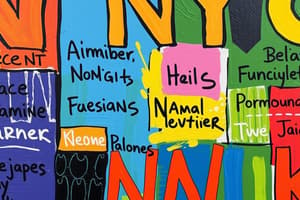Podcast
Questions and Answers
Isalansing ang mga sumusunod na konsepto ng wika sa kanilang kahulugan:
Isalansing ang mga sumusunod na konsepto ng wika sa kanilang kahulugan:
Colloquial language = Pang-araw-araw na pagsasalita ng mga tao sa partikular na komunidad o grupo Slang = Uri ng wika na bahagi ng pang-araw-araw na paggamit, binubuo ng mga salita o parirala na itinuturing na di-pormal at karaniwang limitado sa espesyal na konteksto o grupo
Tukuyin ang kaugnayan ng mga sumusunod sa pinagmulan ng slang:
Tukuyin ang kaugnayan ng mga sumusunod sa pinagmulan ng slang:
Rhyming slang word 'Australia' = Nangangahulugan ng 'sovereign' noong huling bahagi ng ika-18 siglo Urbanization, global migration, technological advancements, changing societal norms = Mga salik na nakatulong sa pag-usbong ng slang
Ano ang ibig sabihin ng 'transient nature' sa konteksto ng slang?
Ano ang ibig sabihin ng 'transient nature' sa konteksto ng slang?
Mabilis na paglitaw at paggamit = Pangmatagalang paggamit =
Paano nagbabago ang slang sa paglipas ng panahon?
Paano nagbabago ang slang sa paglipas ng panahon?
I-matched ang sumusunod na internet slang sa kanilang kahulugan:
I-matched ang sumusunod na internet slang sa kanilang kahulugan:
I-matched ang mga sumusunod na pahayag ukol sa epekto ng slang sa lipunan:
I-matched ang mga sumusunod na pahayag ukol sa epekto ng slang sa lipunan:
I-matched ang mga sumusunod na paraan ng paglitaw ng slang:
I-matched ang mga sumusunod na paraan ng paglitaw ng slang:
I-matched ang mga sumusunod na epekto ng slang sa komunikasyon:
I-matched ang mga sumusunod na epekto ng slang sa komunikasyon:
Study Notes
Colloquial Language: Slang and Its Influence on Society
Colloquial language refers to the everyday speech used by people in specific communities or social groups. It often includes expressions, idioms, and terms that are unique to those communities and may not be found in formal dictionaries. Slang is one aspect of colloquial language that has gained significant attention due to its widespread influence on society. In this article, we will explore the concept of slang, its origins, its evolving nature, and its impact on various aspects of life.
What Is Slang?
Slang can be defined as a type of language that forms part of colloquial usage, consisting of phrases or words considered to be informal, nonstandard, and typically restricted to special contexts or social groups. It is often characterized by its rapid emergence, widespread use, and transient nature, making it distinct from other forms of language like formal dialects and standardized languages.
Origins of Slang
The origin of slang can be traced back to historical events and sociocultural developments. One notable example is the term "slang," which evolved from a rhyming slang word "Australia," meaning "sovereign," and was popular in the late 18th century. Other factors contributing to the rise of slang include urbanization, global migration, technological advancements, and changing societal norms.
Evolving Nature of Slang
Slang constantly evolves over time, reflecting changes in society, culture, and technology. New slang terms emerge through processes such as blending, borrowing, innovation, and metaphorical extension. For instance, the emergence of internet culture has given birth to digital slang, including acronyms (e.g., LOL for "laugh out loud") and emoticons (e.g., :)).
Impact of Slang on Society
Slang plays a crucial role in shaping our understanding of culture and social trends, influencing how we communicate and understand the world around us. It also serves as a tool for creating group identity and reinforcing social hierarchies within different communities. Nevertheless, slang can sometimes be criticized for its perceived vulgarity or negative connotations, leading to its exclusion from formal dictionaries.
In conclusion, colloquial language, particularly slang, represents an integral part of human communication. It reflects the dynamism of our societies and cultures, offering insight into their values, beliefs, and shared experiences. As society continues to evolve, so too does the landscape of colloquial language, with new expressions and meanings emerging to capture the mood of the times.
Studying That Suits You
Use AI to generate personalized quizzes and flashcards to suit your learning preferences.
Description
Explore the fascinating world of colloquial language and slang, its origins, evolving nature, and impact on society. Learn about the unique expressions, idioms, and terms that shape communication within different social groups.




